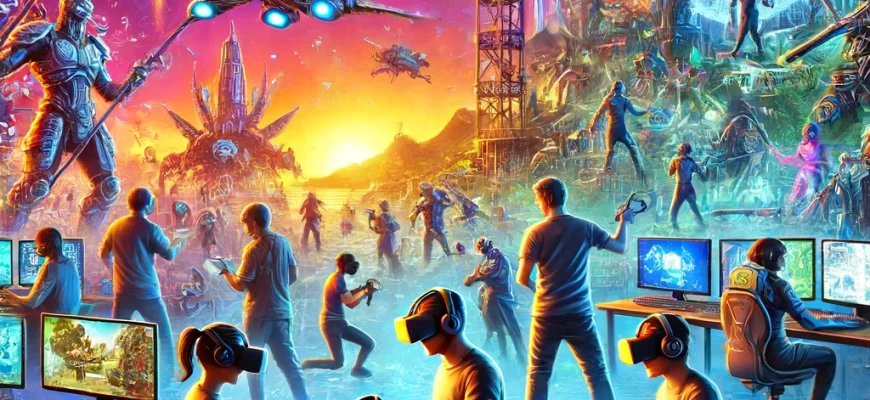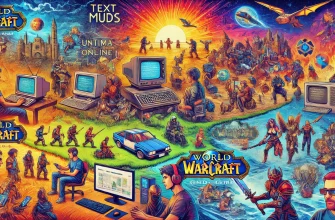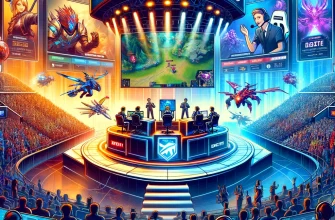- Introduction
- The Evolution of VR in Gaming
- Early Developments
- Modern VR Gaming
- The Immersive Experience
- Visual and Auditory Immersion
- Physical Interaction
- Popular VR Online Games
- VR MMORPGs
- VR FPS and Action Games
- The Social Aspect
- Virtual Communities
- Collaborative Gameplay
- Challenges and Barriers
- Technical Limitations
- Content Availability
- Accessibility and Inclusivity
- The Future of VR in Online Gaming
- Technological Advancements
- Expanding Game Genres
- Mainstream Adoption
- Conclusion
Introduction
Virtual Reality (VR) technology is revolutionizing the online gaming industry, offering immersive experiences that transcend traditional gaming paradigms. As VR continues to evolve, it is set to become the next frontier in online gaming, providing players with unprecedented levels of interactivity and immersion. This article explores the current state of VR in online gaming, its potential, challenges, and the future landscape of this exciting technological advancement.
The Evolution of VR in Gaming
Early Developments
The concept of VR has been around since the 1960s, but it wasn’t until the 1990s that it began to enter the gaming scene. Early attempts, such as the Sega VR and Nintendo’s Virtual Boy, were ambitious but ultimately failed due to technical limitations and high costs.
Modern VR Gaming
The modern era of VR gaming began in earnest with the release of devices like the Oculus Rift in 2016, followed by the HTC Vive and PlayStation VR. These devices offered improved graphics, motion tracking, and more affordable pricing, making VR accessible to a broader audience. These advancements laid the groundwork for VR to become a viable platform for online gaming.
The Immersive Experience
Visual and Auditory Immersion
VR provides a level of immersion that traditional gaming cannot match. High-definition visuals and spatial audio create a sense of presence, making players feel like they are truly inside the game world. This sensory immersion is further enhanced by 360-degree environments that players can explore.
Physical Interaction
Motion controllers and haptic feedback devices allow players to interact with the game world in a physical manner. Actions such as swinging a sword, aiming a gun, or picking up objects are mirrored in the virtual environment, providing a more intuitive and engaging experience.
Popular VR Online Games
VR MMORPGs
Games like “OrbusVR” and “Zenith: The Last City” are pioneering the VR MMORPG genre. These games offer expansive worlds where players can team up, complete quests, and engage in large-scale battles, all within a fully immersive VR environment.
VR FPS and Action Games
First-person shooters and action games are particularly well-suited for VR. Titles like “Pavlov VR” and “Population: One” provide fast-paced, adrenaline-pumping gameplay that benefits greatly from VR’s immersive qualities. Players can physically duck behind cover, aim their weapons with precision, and communicate with teammates using natural gestures.
The Social Aspect
Virtual Communities
VR online games foster a sense of community among players. Virtual worlds become social hubs where players can meet, interact, and build relationships. This social interaction is more impactful in VR, where avatars can convey body language and facial expressions.
Collaborative Gameplay
The cooperative nature of many VR games encourages teamwork and collaboration. Players can strategize, solve puzzles, and achieve objectives together, enhancing the social experience and making gameplay more dynamic and engaging.
Challenges and Barriers
Technical Limitations
Despite significant advancements, VR technology still faces technical challenges. High-quality VR requires powerful hardware, which can be expensive. Additionally, issues like motion sickness and limited field of view can detract from the experience.
Content Availability
The availability of high-quality VR games is still limited compared to traditional gaming platforms. Developing VR content is resource-intensive, and the market is still growing, leading to a relatively small library of games.
Accessibility and Inclusivity
VR gaming requires specific equipment, including VR headsets and motion controllers, which may not be affordable or accessible to all players. Ensuring that VR gaming is inclusive and accessible to a diverse audience is a significant challenge that needs to be addressed.
The Future of VR in Online Gaming
Technological Advancements
Ongoing advancements in VR technology, such as improved hardware, wireless headsets, and better motion tracking, will continue to enhance the gaming experience. Innovations like eye-tracking and advanced haptics are expected to provide even more immersive interactions.
Expanding Game Genres
As technology improves, we can expect to see a broader range of game genres adopting VR. From strategy games and simulations to sports and educational games, VR has the potential to transform how we experience various types of games.
Mainstream Adoption
As VR technology becomes more affordable and accessible, it is likely to see mainstream adoption. This will lead to a larger player base, more investment in VR game development, and a richer selection of VR gaming content.
Conclusion
Virtual Reality is poised to become the next frontier in online gaming, offering immersive, interactive, and socially engaging experiences that are unparalleled by traditional gaming platforms. While challenges remain, the rapid pace of technological advancements and growing interest in VR promise a bright future for this exciting medium. As VR continues to evolve, it will undoubtedly reshape the landscape of online gaming, providing players with new and thrilling ways to engage with virtual worlds and each other.









